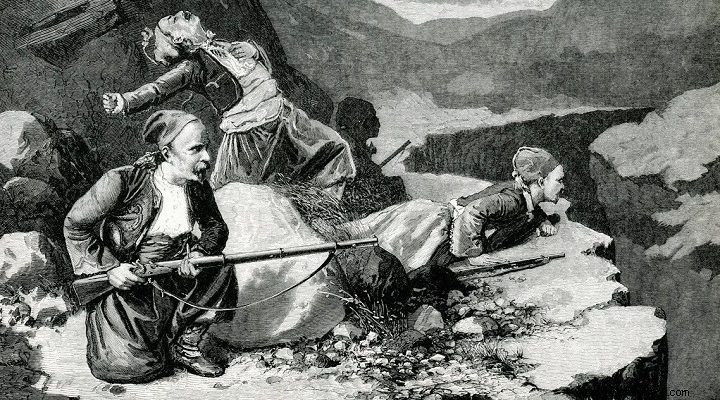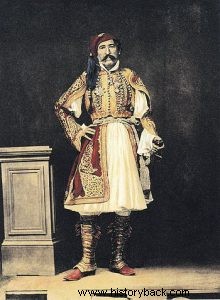
With the outbreak of the Crimean War, the Greeks thought that the time had come to liberate their unredeemed homelands. In 1854 revolutions broke out in Epirus, Macedonia and Thessaly.
In Thessaly, the leadership was assumed by King Othona's aide-de-camp Major General Christodoulos Hadjipetros. Hatzipetros left Lamia on March 14, 1854 at the head of 500 men. After crossing the border he was joined by 1,500 more men of the chieftains Stratus, Ragus, Katarachia and Ziakas. The Greeks headed to the Karditsa Lighthouse. The rebel chieftains had already defeated twice as many Turks as were there and forced them to retreat.
Other divisions of Greeks under Tzamalas, Panourias and Diovouniotis (sons of the homonymous chieftains of 1821), had gathered towards Almyros and attacked and defeated the Turks in the village of Platano. On March 23 three Turkish regular battalions together with 500 irregular Albanians, 30 horsemen and three cannons, attacked the approximately 2,000 Greeks at Platanos. Despite their superiority, the Turks were defeated leaving 150 dead on the field.
However the Turks were reinforced and attacked again. The Greeks were forced to retreat, although they fought bravely and killed at least 150 Turks, losing 34 men, including 11 Hungarian Philhellenic heroes who were burned alive but did not surrender, defending a mill. The Turks were reinforced with 6,000 more Egyptians while they were supported from the sea by a French frigate.
The great victory in Megala Kalyvia
In western Thessaly Hadjipetros and his companions developed a great activity. Ragos and Stratos defeated the Turks at Mavrommati (today's Karaiskaki) Karditsa. Then, on April 5, the Rebels led by Hadjipetros arrived at the Great Huts of Trikala.
The Greeks numbered around 3,000 men. Underestimating them, the Turks, under Ismail Frasaris and Hotobei, attacked them with 1,500 Albanians, 200 horsemen and two cannons. But they were defeated, leaving behind 50 dead.
At the same time, the Greeks besieged Domokos but failed to capture the city. Hadjipetros then marched against Kalambaka. The Turks under Selim Pasha had 2,000 infantry, 500 cavalry and eight cannons against the Greeks who were gradually reinforced and reached 2,500 men.
Triumphant victories in the battles for Kalambaka
Clashes around Kalambaka began on May 1 and lasted for days. On May 5, Selim Pasha launched an attack against the Greek positions but was repulsed losing 200 men.
Reinforced, he attacked the Greeks again, particularly pressing the divisions of the chieftains Leotsakos and Plaputos. At the critical moment, however, a body of Macedonians intervened and the Turks were crushed, losing 500 men, against 19 Greeks.
Despite the defeat, Selim decided to attack again the next day. But again he was defeated state by state. The Greeks even pursued the Turks as far as Pineos where many Turks drowned trying to escape. The Greeks captured 500 rifles, five cannons and captured 200 men of the Turkish army.
Inglorious ending
By the end of May the Turks had been reinforced and their forces now numbered around 8,000 men. They then attacked regardless of casualties. Although they lost at least 1,000 men, the Turks managed to prevail after a three-day conflict.
Furthermore, it had become known that Britain and France had imposed neutrality on Greece and the morale of the Greeks had been affected. After the last battle Hadjipetros retreated to Neohori. There he also issued his last order of the day.
"Soldiers of Thessaly, of Agrafa, of Pindus, of Olympus, we withdraw from the battle bowing down to the invincible circumstances. But the land of our fathers, the place of our birth is justly inalienable to all. Although they recede over time, they are not forgotten.. we lay down our weapons hoping that the powerful of the Earth want to understand..." , he wrote.
Unfortunately, the powerful on Earth only care about their own interests and thus the successful, until then, revolution of the Greeks in Thessaly, was extinguished. The Greek land of Thessaly would have to wait 27 more years for freedom.

Lieutenant General Christodoulos Hadjipetros.
